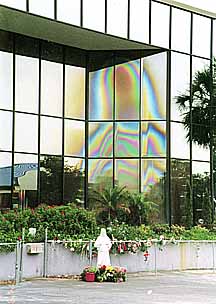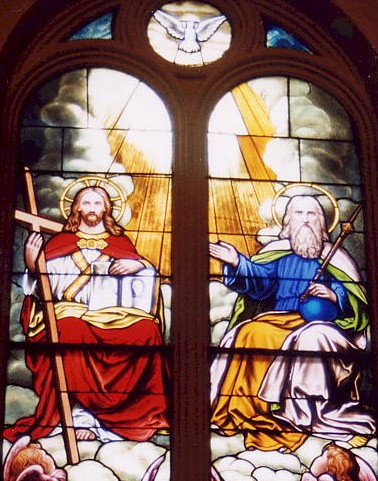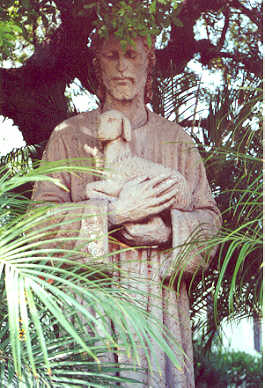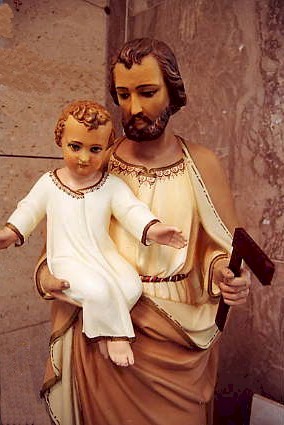-
Scripture quotations are taken from The
New Jerusalem Bible, Doubleday.
-
Pope John Paul II, Encyclical Letter.
On Human Work, United States Catholic Conference, No. 4.
-
Ibid., No. 24.
-
The Documents of Vatican II,
"The Pastoral Constitution on the Church in the Modern World",
No. 68. America Press edition.
-
Edward Leen, C.S. Sp., In the
Likeness of Christ, Sheed and Ward, pp. 126-128.
-
Thomas Merton, Love and Living,
Harcourt Brace and Company, pp. 177-178.
-
John Henry Cardinal Newman,
"Parochial and Plain Sermons", v, pp 139-40, as in The Heart
of Newman, A Synthesis Arranged by Erich Przywara, S.J., Ignatius
Press, pp. 171- 172.
-
Edward Leen, C. S. Sp., The True Vine
and Its Branches, P. J. Kenedy & Sons, pp. 25-26.
-
Romano Guardini, Jesus Christ,
Henry Regnery Publ., as in Daily Readings in Catholic Classics,
edited by Rawley Myers, Ignatius Press, p. 85.
-
St. Alphonsus Ligouri, Tract, de
praxi amanda Jesum Christum, edit. latina, Romae, 1909, pp. 9-14, as
in the The Liturgy of the Hours, Catholic Book Publishing Co., Vol
IV, pp. 1264-1265.
-
Archbishop Luis M. Martinez, The
Sanctifier, Pauline Books & Media, p. 48
-
The Documents of Vatican II,
"Constitution on the Sacred Liturgy", America Press edition, No.
17.
-
Ibid., No. 48
-
Pope Pius XII, Encyclical Letter, Mystici
Corporis, AAS, XXXV, 232-233.
-
Directory on the Ministry and Life of
Priests, as in special supplement, Inside the Vatican, November
1994, No. 14.
-
Pope John Paul II, Holy Thursday
Letters to My Brother Priests, edited by James P. Socias, Scepter
Publishers and Midwest Theological Forum, pp. 147-148.
-
Jean Galot, S.J., Theology of the
Priesthood, Ignatius Press, p. 137.
-
Henri Nouwen, Reaching Out,
Doubleday, pp. 89-90.
-
Henri Nouwen, Genesee Diary,
Doubleday, p. 361.
-
Mother Teresa, In My Own Words,
Ligouri Publications, p. 19.
-
Ibid., p. 71.
-
Avery Dulles, S.J., The Splendor of
Faith: The Theological Vision of Pope John Paul II, Crossroad
Publishing Company, pp. 1-2.
-
Ibid., p. 196.
-
Pope John Paul II, Encyclical Letter,
On the Hundredth Anniversary of Rerum Novarum, St. Paul Books &
Media, No. 58.



 that it became
more laborious. For the support of the family and its care of the poor
devolved, then, entirely on His shoulders. He had to work hard in order to
keep Himself and His Mother and to have something to give to others less
favoured than themselves. Unremitting toil became His lot, and the soft
hands of the boy became roughened and hardened with the constant pressure
of the tools of His trade. Work could not have been plentiful in the
confines of that narrow village and it is likely that He had, often, to go
abroad to look for employment. He had to face rebuffs from those who
needed not His services, and discourtesy and rudeness from those who
employed Him. The Nazarenes were not a polite people. As He handed over to
His grumbling clients the accomplished tasks, He had to hold forth His
hand to receive His wages...There is something inexpressibly touching in
this picture of God receiving from His creatures the wages He earned in
their employment!...
that it became
more laborious. For the support of the family and its care of the poor
devolved, then, entirely on His shoulders. He had to work hard in order to
keep Himself and His Mother and to have something to give to others less
favoured than themselves. Unremitting toil became His lot, and the soft
hands of the boy became roughened and hardened with the constant pressure
of the tools of His trade. Work could not have been plentiful in the
confines of that narrow village and it is likely that He had, often, to go
abroad to look for employment. He had to face rebuffs from those who
needed not His services, and discourtesy and rudeness from those who
employed Him. The Nazarenes were not a polite people. As He handed over to
His grumbling clients the accomplished tasks, He had to hold forth His
hand to receive His wages...There is something inexpressibly touching in
this picture of God receiving from His creatures the wages He earned in
their employment!...